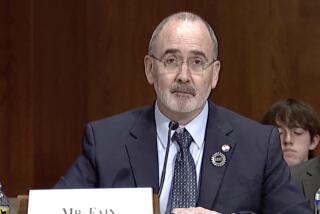The flaw in ‘card check’
Congress fought back against the Depression and unemployment in the 1930s with the National Labor Relations Act, protecting employees who wanted to organize unions but who feared management retaliation. The pendulum swung away from labor in 1947 when Congress passed the Taft-Hartley Act over President Truman’s veto. It has never swung back, and in fact, labor organizers have been stymied by a succession of regulatory restrictions and hostile National Labor Relations Board decisions that have helped undermine the 1935 act’s stated policy of encouraging collective bargaining to negotiate terms and conditions of employment.
Now Congress is considering a bill aimed at correcting the balance and affording employees real power to organize and participate in meaningful contract negotiations. One part of the proposed Employee Free Choice Act of 2009 ought to be a no-brainer: adding teeth to today’s penalties against employers who improperly intimidate workers or engage in other unfair labor practices. If anything, that portion of the bill ought to be enhanced.
A second part, calling for an arbitrator to impose a two-year initial contract when negotiations and mediation fail, has drawn strong protest from business, which currently can drag out contract talks forever and thus negate employees’ decision to organize. Filibustering against a properly elected union is an abuse of the collective bargaining process, and binding arbitration is an appropriate way to stop it. Regulations would fine-tune the arbitrator’s role; rule makers ought to consider imposing either side’s last, best offer as a way to encourage both sides to be more realistic in their offers and make negotiations more productive.
These two reforms are too often dismissed as lesser components of this three-part bill. But they should not be overlooked. They’re crucial proposals that would swing the pendulum back and return some power to employees.
The third part of the bill is the one that troubles us. It would eliminate the secret-ballot elections that are used in most organizing campaigns and replace them with a method variously known as majority sign-up, petitioning or “card check.” This change would correctly take away from management the power to pick employees’ method of voting on whether to organize. But instead of returning that decision to the people who ought to have it -- the employees -- it would award it to a labor union, an outside third party that has the potential to become the employees’ representative in bargaining but isn’t yet, and shouldn’t be before the vote.
There is no doubt that card check -- in which union organizers try to persuade more than half the workers to sign cards or petitions selecting a particular union as their representative -- favors unions. It becomes common knowledge which workers have signed and which have not. Organizers can canvass the holdouts and target those most likely to succumb to union campaigning or peer pressure. But it is the workers’ power to select a union that we’re trying to protect, not the union’s power to organize employees.
A chief argument of anti-union commentators against card check is that the secret ballot is inherently neutral, in the time-honored American tradition of elections, and protects employees’ ability to express their decision free from pressure exerted by either labor or management. But that’s only part of the story.
The integrity of a secret-ballot election is a result not just of its private nature but of the context in which it is cast. Elections for political office, for instance, are open, with each candidate enjoying unfettered ability to state his or her case to whatever voters will listen. Threats and claims, even those whispered secretly to select voters, quickly become public and are tested by vigorous debate. Balloting takes place not in the office of the incumbent but in schools, churches and garages free from control by any politician. Candidates have no power to retaliate against citizens who dare to campaign for the “wrong” side. Elections recur at regular intervals, and voters can undo any mistakes they believe they made in the previous election.
Contrast that with the workplace version of the secret ballot. Employers may prevent labor organizers from entering the job site, but may round up their workers for periodic lectures and presentations on the supposed evils of unions. Balloting takes place ostensibly under the control of neutral labor officials, but under the watchful eye of the employer, who controls the workers’ route to and from the ballot box. Employees who campaign for the union cannot legally be fired, demoted or harried in retaliation, but often are; employers have to pay back wages but suffer nothing else of consequence. Meanwhile, procedures for investigating and punishing misconduct are so time-consuming that the worker must spend years without a job, perhaps branded an unemployable pariah by other businesses.
There are two courses to remedying this unacceptable status quo. The first is to revoke management’s power to mandate a secret ballot, as proposed under the bill. The second -- and the one we support -- is to keep the secret ballot but change the context in which those votes are conducted, so that management no longer has undue power over the employees’ decision-making process. This would mean stiffening penalties for unfair labor practices beyond merely the payment of back wages. The bill requires immediate investigation of retaliation claims and, for the first time, awards civil penalties of up to $20,000 for each violation. That’s a good first step, but Congress should go even further, requiring neutral sites for elections and shortening the preelection period during which management can campaign, unimpeded, against the union.
Although we sympathize with the bill’s efforts to address the balance of power between unions and management, we do not support it as written. Unions should be free to exercise their power on behalf of workers, but only after workers have designated them as their representatives in a process that reduces the possibility of intimidation from either side.
More to Read
A cure for the common opinion
Get thought-provoking perspectives with our weekly newsletter.
You may occasionally receive promotional content from the Los Angeles Times.






